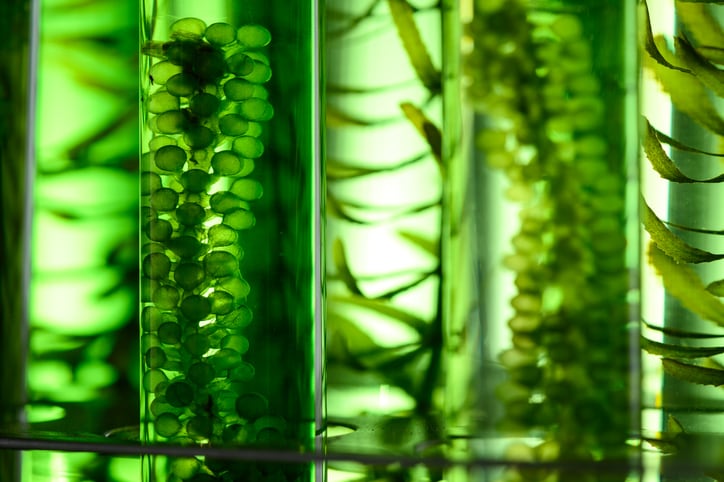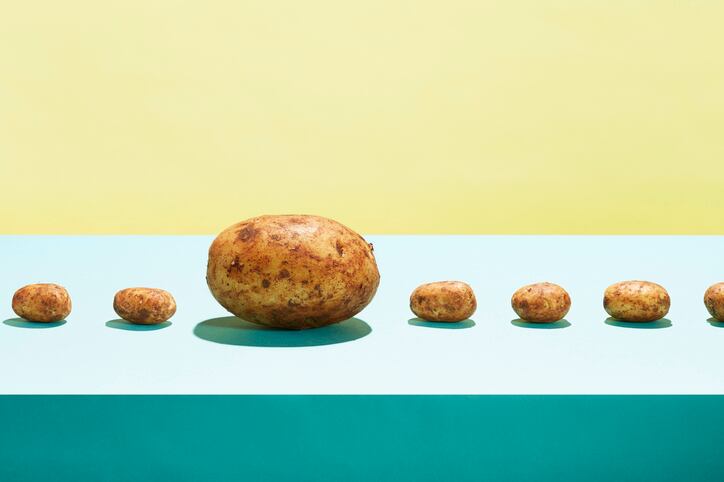To feed a growing global population expected to reach 10 billion by 2050, land equivalent to the size of Africa would need to be converted for agricultural use, at great cost to biodiversity and the climate, unless new ways of sustainably producing nutrient-dense food – like that devised by climate-tech food startup Arborea – are adopted.
Arborea says it can meet future protein needs with only a fraction of the land – equivalent to roughly the size of the New York metropolitan area – and significantly less water than conventional methods. It also touts added benefits of its production methods, including no nutrient runoffs to negatively impact lakes, rivers or coastal waters, and the ability to sequester 100 times more carbon dioxide than an average forest of the same size.
In this episode of FoodNavigator-USA’s Soup-To-Nuts Podcast, company founder and CEO Julian Melchiorri and Global Commercial Director Kaly Chatakondu explain how this is possible thanks to Arborea’s breakthrough modular BioSolar Leaf cultivation system. Speaking from Future Food-Tech Chicago, they also share how their technology stacks up to other popular protein biomanufacturing platforms, like precision fermentation and cell cultivation, and note that while their approach sounds futuristic it already is producing a range of multi-functional proteins and superfood ingredients from micro-algae that are clean tasting and work in versatile applications.
Explore past episodes of Soup-To-Nuts podcast
Never miss an episode of FoodNavigator-USA’s Soup-To-Nuts podcast - subscribe today.
Catch up on past episodes of Soup-To-Nuts:
The war on sugar: Are better-for-you options unfairly caught in the crosshairs? - Republican leaders are amping up the war on sugar by taking aim at categories historically laden with the sweet stuff, but are better-for-you products accidentally getting caught in the crossfire?
Prop 65 pushback: Landmark ruling curbs cancer warnings for dietary acrylamide – A landmark federal court decision to block mandatory cancer warnings for dietary acrylamide under California’s controversial Prop 65 is a major win for food manufacturers – and could offer protective precedence for compelling warnings based on shaky science in violation of First Amendment rights
Eat well, age better: How a subtle shift from wanting longevity to vitaltity is reshaping the food landscape - Consumers want more than a long life - they want a good one, and to get it they are changing what and how they eat, according to new research
Five strategies to boost share as geopolitical tensions and inflation constrict consumer spending – CPG sales and volumes are slipping among persistent inflation and tariff fears, but Circana uncovers how food and beverage manufacturers are maintaining – and gaining – share despite the shaky market
Where is the line for ingredient bans and when should companies comply vs pushback? – FDA’s sweeping plan to eliminate synthetic colors from the US food system announced last week marks a turning point in the war on food dyes that has long been fought at the state level and which before that pitted big food against outspoken consumer advocates who often relied on passion and fearmongering more than science
The food system and planet are under pressure
Despite significant advances in food production and a slowdown in global population growth compared to decades ago, the World Resources Institute estimates the requirements to sustainably feed 10 billion people by 2050 would require a 56% increase in crop calories compared to 2010. It projects this would require an additional 593 million hectares of land if produced under the current “business as usual” approach and produce a 11-gigatone greenhouse gas mitigation gap between expected agricultural emissions in 2050 and the target level needed to hold global warming below 2 degrees Celsius.
This is a tall order given the earth’s existing constraints, according to Melchiorri.
“We all know already that obviously the current food system is exceeding limits in terms of carbon dioxide emissions, water and land use,” and this is “intrinsically impacting many biological systems on our planet,” but at the same time, the population is growing as is the need for more food, he said.
In response, he said, Arborea launched with a mission to create healthy and nutritious food without increasing climate change and biodiversity loss. Melchiorri explains this is possible thanks to the company’s proprietary BioSolar Leaf technology, which mimics nature’s ability to harness sunlight to grow microalgae and produce protein, omega-3s and other nutrients while simultaneously capturing carbon dioxide and releasing oxygen.
“We are industrializing photosynthesis. We turn carbon dioxide and sunlight into food ingredients and protein without fertile land. Our technology is so land efficient that we are able to meet the global protein needs in just the surface area of Greater New York. So you can imagine how much land we can either give back to nature or we can at least interrupt that cycle between food production and biodiversity loss,” he said.
He explained the company’s BioSolar Leaf technology can grow any of the 30,000 plus photosynthetic microorganisms that are available naturally by “mimicking the breathing mechanisms of human lungs to solve the major bottlenecks that was existing to grow these microorganisms at scale.”
In addition, the technology is able to sequester carbon dioxide and its bioproduct is oxygen.
Melchiorri argues Arborea’s BioSolar Leaf technology also is less expensive, more modular, and better for the environment that other biomanufacturing platforms for protein production, including fermentation.
Arborea’s ingredients are nutrient-dense, multi-functional and versatile
Arborea’s Global Commercial Director Kaly Chatakondu explains the ingredients the company is able to produce with its BioSolar Leaf technology are nutrient-dense, versatile and can be used across applications to deliver multiple functions without impacting taste.
“The exciting thing about this technology is, essentially, we are turning carbon dioxide into any photosynthetic microalgae, but these microalgae are superfoods. They are packed with protein. They are packed with bioactive micronutrients and as a result, we have an unlimited source of proteins, bioactive nutrients and natural colors – all without needing fertile land,” he said.
For example, the company creates a protein from spirulina that is water soluble, neutral in taste and color, and can foam, gel and be used in virtually any food or beverage, he said.
Beyond proteins and colors, the technology can make essential lipids and other bioactive nutrients, he added.
Ready to partner: Arborea has samples and facilities to collaborate with manufacturers
Arborea is currently making samples of its ingredients and working with food and beverage manufacturers to jointly create new product concepts that Chatakondu says could be on store shelves soon.
He noted the company has a fully equipped food science lab in London where it can make prototypes, and a fully working pilot facility in Lisbon, Portugal, where it makes kilograms of samples for corporate customers.
“We are going have the full-scale production facility in the back end of next year, so that will make several 100 tons of product,” he added.
The long-term goal for Arborea is to include its ingredients in multiple food applications as well as standalone proteins, and to build its BioSolar Leaf facilities in every country around the world to shorten supply chains and better use the limited resources available to meet the increasing needs of a growing population.




